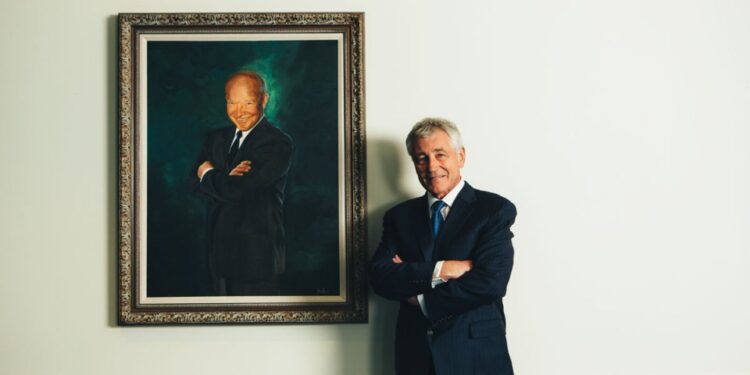On March 8, 2013, a young man biked to the gates of the Afghan Defense Ministry and detonated a bomb strapped to his chest. The massive explosion, which killed nine civilians, shook a nearby building in which then-new U.S. Secretary of Defense Chuck Hagel was meeting with military officials.
“This attack was a message to him,” a Taliban spokesman emailed to reporters soon afterwards.rHagel wasn’t listening. Inside a briefing room, the twice-wounded Vietnam vet appeared more curious than concerned as the building rocked. Within seconds, he was back on task, discussing the intricacies of winding down the longest war in U.S. history.
“No kidding — he barely flinched,” says Hagel’s former press secretary, George Little, who was in the room at the time. “That’s just who he is. He’s so focused on goals that nothing fazes him.”rThose goals, if attained, will make history. The former U.S. Senator from Nebraska will guide the U.S. Armed Forces through the transition from an unpopular two-front war he famously opposed into a lean, nimble, cutting-edge force poised for 21st century challenges. High-tech weaponry and cyber defenses designed to defend against more advanced foes will be increased. The Pacific Rim will receive more focus. Aging, cumbersome machines of war will be mothballed.
But Hagel hopes to leave more than a legacy of hardware, strategy, and efficient power projection. He wants his legacy to be a sort of antithesis to Vietnam. Empathetic leadership. Conflict seen as only a wicked necessity. A fighting force that can skirt quagmires, disrupt and disable from a distance, and better armor flesh and blood.
All this amid constant criticism, political dysfunction, and ever-shapeshifting crises. An unstable Ukraine. Putin. Syria. Mosul. The screwball menace of Kim Jong-un. “The Middle East in flames,” Hagel adds. Domestically: The VA scandal. The Bergdahl controversy. The sexual assault scandal. Controversy after controversy.
And he also runs a department with more than three million employees. “You’ll never know all of it, you can never know all of it,” he says from his office at the Pentagon. “What you must do is not get dragged down into the underbrush with stuff that’s not a top priority to know.”
You must remain calm. Keep studying, he says. Know your history. Learn from the mistakes of history and the lessons of your own history. Talk candidly with everyone from generals to privates, warriors to desk jockeys. Always listen, he says. Always be empathetic.
And somehow, remain unbowed by the bombs exploding around you.
“Chuck is singularly prepared for a job like this,” says former U.S. Senator and Nebraska Gov. Bob Kerrey, a fellow decorated Vietnam vet. “He’s focused, he believes in what he’s doing, he has an amazing ability to stay positive through tough times. Add to all that his life experience. He was an enlisted man, he’s seen it all. He knows what it’s like, and what it means, to actually be there.”
Two photos hang on the family room wall in Tom Hagel’s home in Dayton, Ohio. One shows Tom and his older brother Chuck dressed in their altar boy gowns standing in front of a modest Catholic church in Ainsworth, Neb. (“That brick you see was just a façade on a Quonset Hut,” Tom says). The irony of the photo isn’t lost on the brothers. “I was not a choir boy,” Tom says. “We were very different people,” says Chuck.
The second photo shows Tom and Chuck with arms around each other, drinks in hand, at a party held at their rental house in North Omaha not long after they returned from Vietnam. Tom still keeps the photo close, both because of what it shows and what it doesn’t.
“All buddy-buddy, right?” explains Tom, an attorney, law professor, and judge in Dayton. “Oh man. In a flash, we’d be after each other. Couple words about Vietnam. A minute after that photo we were in a fistfight, smashing beds, knocking doors off.
“Somebody called the cops. Once the cops got there we were immediately all buddy-buddy and we had each other’s back again. That’s how it was in a nutshell.”
Tom believed Vietnam was a disaster orchestrated for all the wrong reasons. Chuck believed Vietnam was a geopolitical necessity.
Chuck was also the proverbial Good Son. He was a quarterback and class president at St. Bonaventure High School in Columbus (now Columbus Central Catholic). He was driven. He always dressed for success in his still-beloved pleated khakis. “He’s been running for president since he was 16,” Tom says.
In some ways, Chuck’s ship-shape persona was a cover. As he advanced in high school, his father’s alcoholism and downward spiral advanced. Before settling in Columbus, Charlie Hagel bounced his family through numerous towns in western Nebraska. Ainsworth, Rushville, Scottsbluff, Terrytown, York. The jobs got smaller. The houses got smaller—if there was a house. One summer the four Hagel brothers slept in a chicken dormer. Life got more and more unstable. Chuck picked up the slack, stayed focused on goals. Tom rebelled. But Tom still views his father more as a tragic figure than anything else.
“I talked to some of his old buddies in Ainsworth, people who knew him before he went off to World War II,” Tom says. “They said the war changed him—he was a different person when he came back. I think he was a beat-up manic-depressive who was self-medicating. But back then there wasn’t any help. There was just the stigma.”
Charlie died suddenly at age 39 on Christmas morning, 1962. Chuck was 16. So, Chuck became the man of the house, helping his mother watch over the five younger Hagel children. It was hard, but the family always found a way to make do. Chuck says he learned leadership skills at a very young age.
“When my dad died, my youngest brother, Jim, was only in second grade,” Chuck says. “I started coaching his little league teams. I basically became a surrogate father to him.”
After high school, Chuck went off to try his hand at college. Things didn’t work out. He enlisted. Around that time, Tom graduated high school—somehow. “I mean, (Tom) may have gotten enough C’s to graduate,” Chuck says. “But it was probably just a good arrangement for everyone involved to let him out of high school.”
Like Chuck, Tom chose to enlist instead of wait for the draft. “You’re going anyway,” Tom says. “Just as well volunteer and get it over with.”
After training, Chuck was sent to Vietnam. At the time, Tom was stationed in Germany waiting for his orders. Then Tom came up with a plan. Knowing that the U.S. military didn’t allow brothers to serve beside each other in battle (termed the “Sole Survivor Policy”), Tom volunteered to go to Vietnam. He knew he was going anyway. Why not help out his big brother in the process. Chuck, he thought, would get sent home early.
But, SNAFU. “I got there and nobody knew what I was talking about,”
Tom says. Then, in a chain of events that still baffle the brothers, Tom, apparently by coincidence, ended up northwest of Saigon, not only in the same division as Chuck, but in the same squad of the same platoon of the same company. In time, they literally were walking point together.
So the Hagel brothers, it is widely believed, became the only brothers to serve side-by-side in combat in the Vietnam War.
Tom, a scrappy 160-pound teen who liked the outdoors, was better built for jungle warfare than Chuck. “His size worked against him,” Tom says. “I was a wimpy little burnout, but I could move in the mud—I was more comfortable in that environment than he was. I really felt sorry for him. He was a fish out of water.”
The brothers began to lose friends, witnessing horrific scenes that scar both of them still.rWhile on patrol one morning in 1968, a soldier walking point in front of the Hagels stepped on a landmine. Shrapnel hit Tom’s arm. A larger piece lodged in Chuck’s chest. Tom dropped to his brother’s side and bound him with compression bandages to stop the bleeding.
A month later, Chuck dragged Tom from a burning armored personnel carrier. Blood poured from Tom’s ears. Chuck’s face was severely burned.
The Hagels returned home to Nebraska with five Purple Hearts between them (Chuck received two, Tom received three). They returned having had nearly identical experiences. Yet, the two men viewed life and their experiences through very different lenses.
They, did, however, have something very much in common, Chuck Hagel says.r“We both still had no idea what we wanted to do.”
The University of Nebraska—Omaha has provided college educations to thousands of veterans through the G.I. Bill. The school, Chuck Hagel notes, has a long history and strong reputation for helping vets not only get degrees, but also find their way in life. “It really is one of the premier bootstrap universities in the country,” Chuck says. Both Chuck and Tom found professors who inspired and guided them.
Both brothers flourished. Tom angled toward law. “I wanted to save the world,” he says. Chuck moved toward government and politics. He went to Washington, D.C., knocked on doors throughout the city, and finally landed a part-time job on the staff of Nebraska Rep. John McCollister. McCollister, an old-school Nebraska conservative who served from 1971 to 1977, may have influenced Chuck Hagel’s politics, and honed his political acumen, more than any other person in his life. Hagel called McCollister, who died last year at age 92, “the finest public servant I have ever known.”
Through the 1970s, thanks to McCollister, Hagel increasingly found himself in close proximity to the Republican Party elite. In 1980, Hagel campaigned for the Ronald Reagan. Once elected, Reagan decided Hagel was a natural for a veterans-related post. He was nominated for the job of deputy administrator of the Veterans Administration.
Before taking that post, though, Hagel was asked to take over the planning and construction of the 1982 World’s Fair, which, at the time, was on a path to disaster. “I told them I’d never even been to a World’s Fair,” Hagel says. “I had been to a carnival in Beaver Crossing. That’s it.” But, no matter. Hagel went and lived in Knoxville, Tenn., and worked day and night for six months. In the end, the World’s Fair was a success, and Hagel had made a name for himself in the Republican Party. Hagel remembers well flying to the opening event on Air Force One with Reagan. It was May 1, 1982. Hagel rattles off the date without pause. To be sure, Reagan also was a major influence on the future senator’s brand of conservatism.
Besides building his party cred, Hagel learned he could successfully run a large operation. “It was the first big organizational job I had in my life,” he says.
And so, the education of Chuck Hagel continued. After the World’s Fair stint, he took that job with the Veteran’s Administration. Soon, though, he found himself embroiled in controversy. Also, he found himself, for the first time, having to put his career on the line for his beliefs.
In 1982, VA administrator Robert Nimmo made several inflammatory comments about veterans during his push to cut funding for VA programs. Nimmo called veterans groups “greedy” and described the effects of Agent Orange as not much worse than “a little teenage acne.”
Both Hagel brothers had suffered breathing problems after significant contact with Agent Orange. Tom’s current heart problems are blamed on Agent Orange. (“We walked together through areas that looked like moonscapes because of the stuff,” Tom says). Later in the 1980s, the brothers sat on a congressional commission that investigated Agent Orange use in Vietnam.
Chuck resigned amid the flap. He was finished with politics…at least for a while.
From 1982 to 1996, Chuck Hagel was a businessman. A few friends who were in the cable TV business asked Hagel to join them in a new business venture based on a strange new technology—“cellular telephony.” Hagel was asked to invest $5,000. He had little money to show for those seemingly fancy government titles he had held. To raise the money, he cashed in his life insurance policy and sold his 1978 Buick Skylark.
Three years later, Vanguard Cellular Systems was one of the largest cell phone companies in the country. He was quickly a multi-millionaire.
Then: President and CEO of the United Service Organizations. Deputy director of the Private Sector Council. COO of the 1990 G7 Summit. On the board of directors of the American Red Cross.rAlthough some pushed for Hagel to seek to become Governor of Virginia, he moved back to Nebraska in 1992 to become president of the investment-banking firm, The McCarthy Group, LLC. He also served as CEO of what became Election Systems & Software.
In what Tom describes as a move “that was a long time coming,” Chuck finally ran for office. In 1996, he started as a mostly-unknown underdog to replace Jim Exon in the U.S. Senate. But he rose quickly to win in a landslide in the Republican primary, and then upset Ben Nelson in the general election. He quickly became a darling of the Republican Party, amassing one of the most conservative voting records in the Senate. In 2000, he was on the short list of George W. Bush’s picks to be his running mate.
Then, once again, war.
But by 2003, Hagel had, in part thanks to being privy for two decades to countless previously-classified documents related to the Vietnam War, was much more leery of using force—and much less trusting of intelligence sources— than most of his Republican colleagues.
As the country ramped up for an invasion of Iraq, Tom says, he and his brother were no longer diametrically opposed on many issues. “I had moderated, I think he had, too,” Tom says. “Chuck has always been thoughtful, don’t get me wrong. But he learned more about the mistakes of the past through the ‘70s, ‘80s, and ‘90s. He’s very careful now and nuanced in his thinking when others often aren’t.”
Kerrey, who served alongside Chuck in the Senate in the late ‘90s, agrees with Tom Hagel’s assessment of his brother’s mindset at the point Chuck went to battle with his own party over Iraq. “Chuck has experienced so much, he knew the issues inside and out,” Kerrey says. “He knew that people were being fed complete inaccuracies. He knew that things on the ground in Iraq were much more complicated than what people were being told. “When people get wildly enthusiastic about war—which was the case then— there has to be someone like Chuck who is willing to stand up and say, ‘Are you sure?’ He took an immense amount of criticism from Republicans during that time. It took real courage to do what he did.”
Hagel still bristles at the idea he somehow turned traitor on his party. “I am the guy who brought then-President Bush to Omaha to kick off his Immigration Reform effort. I’m the guy who brought President Bush to Omaha to kick off his Social Security reform effort. I was as much of a leader in the Senate on both of those Bush initiatives, but yet, at the same time, I was seriously questioning his policies on Iraq and…why we went to Iraq.”
In 2004, Hagel said he was considering a run at the presidency. But, in 2007, he seemed to run out of patience with the political sphere. His continued verbal lashings of the Bush administration made him fiercely unpopular with many Republicans. Many, most notably John McCain, who had long been a fan of Hagel, fired back. The war of words escalated. In November of 2007, Hagel gave this famous assessment of the Bush administration when he ranked it “the lowest in capacity, in capability, in policy, in consensus—almost every area” of any presidency in the previous 40 years.rThat same year, Hagel declined to run for a third term in the Senate. He stepped into academia, joining the staff of Georgetown University. To those watching from the outside, it looked like Hagel was retiring into the role of wise old sage.
But he quickly found himself on the board of a dizzying array of private and governmental advisory committees. Among his nine commitments, he was co-chairman of President Obama’s Intelligence Advisory Board.
George Little, Hagel’s former press secretary, says that Obama has long been influenced by Hagel’s opinions in military and foreign policy matters. For one, Hagel accompanied Obama during the then-senator’s first trip to the Middle East. Hagel, Little suggests, has likely shaped Obama’s views on foreign policy matters “as much as anyone.”
Kerrey agrees. “Obama and Chuck have significant overlap in how they think and what their values are. Beyond their policy views, they are both clearly men who care deeply about people and care deeply about their country. I can see why they want to work together and why they would work very well together.”
In January of last year, President Obama nominated Hagel to succeed Leon Panetta as U.S. Secretary of Defense. Over thenext several weeks, Hagel would slog through some of the most outrageous accusations and insults he had faced in his entire career in politics.
Tom was there for one of the hearings.
Texas U.S. Sen. Ted Cruz “was suggesting that Chuck was somehow receiving money from terrorists,” he recounts. “It was just crazy hatred. Unbelievable.”
“There was a lot of ugliness,” Kerrey says. “Chuck never should have had to go through that.”
But Hagel powered through the process. Once he was asked to take the job, he says, he was determined to do the job. He believed he had a unique mix of experiences—battle, VA work, running major projects and companies, 12 years as a senator—to do the job uniquely well. He says he believed it was his duty to his country, and particularly those serving their country, to help mold an efficient, effective, and enlightened modern fighting force.
The details of the job are dizzying in scope. To run a department so massive, to deal with so many issues from so many directions, you must try to quickly corral a broad understanding of the issues while not being dragged down by minutia, Hagel says.
As Hagel has worked to gain an understanding of all he could possibly hope to understand, he’s also tried to maintain a strategic mindset. Remember the past; focus on the future, he says.rWhen it comes to strategy, Hagel can’t help but point to Husker football and one of his heroes of strategic planning, Tom Osborne.
“Tom Osborne is one of the best thinkers I’ve ever dealt with,” Hagel says. “You have to think through those four quarters. Where do you want to be in the fourth quarter? Where do I want to be after four years in the Pentagon?
“The other part of what Tom Osborne always talked about is making adjustments. You’ve got to be prepared and build yourself some margin to always adjust to the realities that are going to be confronting you.”
The Secretary of Defense job, done well or done poorly, is surely one of the most taxing in the country, particularly under current conditions. It takes a special personality to thrive in the position. Kerrey says that Hagel is built as well as anyone for such a task.
“I do think it matters that he has that sort of Midwestern, good-natured, can-do attitude,” Kerrey says. “I’m quite sure he’s not necessarily enjoying the job, but I think he has the attitude to keep going and keep doing a good job.”
Hagel plays down any idea that the relentless, pressing, messy issues with which he is tasked daily take a toll on him. His staff says he is generally relaxed and good-natured through tense times. “He definitely has a sense of humor,” one of his assistants says. He keeps his stress down by swimming every day “no matter where he is,” his brother says. Hagel himself says he tries to make sure he gets enough sleep and eats right.
That said, although Chuck denies it, his brother wonders if, in fact, the job is taking a toll. It’s difficult not to agree with Tom’s assessment. There’s visual confirmation.
“My God, compare a picture from December of last year to now,” Tom says. “His hair is white, his eyes are tired. I worry about him. He’ll tell you all day that he’s fine. I just hope he’s telling the truth.”rThe concern of those around him is that, driven toward such lofty goals through such intense fires, he might not be aware of the dangers to his own health.
Hagel himself brushes off the idea that the rigors of the job have worn him down. But, he doesn’t deny that he may push himself too hard sometimes toward the goals he has established. After all, the goals are monumental. And they are goals forged from grave national mistakes that personally wounded him and took the lives of many friends. For Hagel, the job of Secretary of Defense is much more than just eye-candy on a resume.
“Somebody could go through the motions,” Hagel says. “But (that attitude) would fail your people; fail your country. I do not want to do that. There’s too much at stake. This is much, much too important.”













